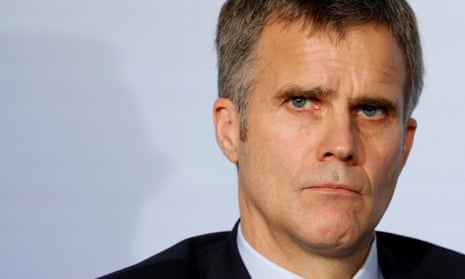
Aletha Adu
Here are those comments from Rishi Sunak’s spokesman on Microsoft’s criticisms of the UK in full.
The Prime Minister’s spokesman said:
More broadly, those sorts of claims are not borne out by the facts. The UK’s games market is rapidly growing. It’s doubled in size over the past decade to its current value of £7bn in 2022.
Last year the UK became the third country in the world to have a tech sector valued at one trillion dollars (£802bn). That’s behind only China and the United States in terms of investment, and the first in Europe by some distance.
We continue to believe, as I set out, that the UK has an extremely attractive tech sector and a growing games market. We will continue to engage proactively with Microsoft and other companies. That won’t change.
Key events
Closing summary: No. 10 in dispute with Microsoft over approach to business
Prime Minister Rishi Sunak is quite at home on the US West Coast (so much so that he and his wife own a penthouse in Santa Monica), so he probably will not welcome being drawn into a war of words with one of the world’s biggest tech companies over his government’s approach to business.
Microsoft reacted furiously after the UK’s competition regulator on Wednesday blocked its $69bn (£55bn) mega-deal to buy games maker Activision Blizzard. Microsoft president Brad Smith criticised the UK’s post-Brexit direction, taking aim at the central project of the Conservative government over the past seven years. He said:
For all of us who had some hope that the UK post-Brexit, that the UK would construct a structure that would even be more flexible, that would be better for investment, better for technology, we’re now finding that the opposite appears to be true.
Sunak’s spokesman was forced to respond that Smith’s comments were “not borne out by the facts”.
We continue to believe, as I set out, that the UK has an extremely attractive tech sector and a growing games market. We will continue to engage proactively with Microsoft and other companies. That won’t change.
In other news from the business world today:
-
The UK government had probably hoped that its biggest business intervention of the week would be its gambling white paper, which laid out tighter regulations for the sector aimed at preventing heavy losses on the most addictive online products.
-
The new boss of the Confederation of British Industry said it is likely to be renamed as part of an overhaul following a sexual harassment scandal revealed by the Guardian.
-
The US economy slowed sharply from January through March, decelerating to just a 1.1% annual pace as higher interest rates hammered the housing market and businesses reduced inventories.
-
The train drivers’ union Aslef has announced three more days of rail strikes in May and June, dashing hopes that the long-running dispute could be coming to an end.
You can continue to follow our live coverage from around the world:
In the UK, Steve Barclay says the Royal College of Nursing left him with no choice but to go to court to block unlawful strike
In the US, Kevin McCarthy basks in rare win after Republicans unite to pass debt ceiling plan
In our coverage of the Russia-Ukraine war, Moscow makes nuclear weapons threat if ‘patience’ is ‘tested’; Mykolaiv death toll rises to seven
In our coverage of the Sudan crisis, the UK appeals to generals to put Sudanese people first as fighting intensifies in Darfur
Thank you for following today, and please do join me tomorrow for more live coverage. JJ
Flutter Entertainment, the owner of Betfair and Paddy Power, has said the UK government’s gambling reforms could cost the FTSE 100 company between £50m and £100m a year from 2024 onwards.
That adds to £150m already “removed” from its revenues by voluntary actions and extra costs made ahead of the rules, it said.
Liz Ritchie founded campaign group Gambling with Lives, with her husband after their son, Jack, took his life because of gambling addiction. She said:
After a long fight we’ve won concessions on some of the key areas but so much more needs to happen to reduce the horrendous harm caused by one of the most loosely regulated gambling industries in the world.
We’ve won the argument against a powerful gambling lobby but this is just the beginning. There’s another family devastated by gambling suicide every day, and we won’t stop until the deaths do.
Peter Jackson, Flutter’s chief executive, said the reforms were “a significant positive moment for the UK gambling sector, raising standards and bringing the regulatory framework into the digital age”.
Flutter said it will lobby in the consultations on rules for “providing support to the minority at risk of gambling harm without interfering disproportionately with the enjoyment of the vast majority”.
Jillian Ambrose

BP’s annual general meeting has erupted in protest, forcing the oil giant to call security to forcibly remove climate campaigners.
BP chairman Helge Lund barely finished the first line of his address to shareholders before the first protestor, a woman, called on BP to take responsibility for its role in the climate crisis. Within ten minutes three protestors were removed by security personnel, which have maintained a high profile presence at this year’s event.
The protestor said:
You need to be taking action right now, today. It’s not enough. It’s just not good enough. People are dying because of your operations now. Step up and take responsibility. Stop your drilling. Stop your lies. This is an emergency.
BP company secretary Ben Matthews apologised to shareholders for the language and conduct of the protestors as they were removed, with a smattering of applause heard from some shareholders at the meeting, before returning the floor to Lund.
A string of pension funds are expected to vote against Lund’s re-election at this year’s AGM after BP watered down its green commitments earlier this year without consulting investors.
Lund said:
Not everyone will agree with every decision we’ve made. There will always be a range of views. We are listening to those views. And we are grateful for the broad support shareholders have given so far.

Kalyeena Makortoff
The CEO of Lloyds Banking Group is ordering staff to spend at least two days a week in-office, in a move that its union claims will do “immediate and tangible damage” to work-life balance and family budgets.
Charlie Nunn made the announcement in a note to staff this morning, which also explained that anyone working compressed hours would have to negotiate new working patterns with managers, Accord said.
🚨 Lloyds Banking Group announces changes to hybrid and compressed hours working.
Read more about the proposed changes, Accord’s reaction and how we’ll be supporting our members 👇https://t.co/jPp77XzitM
— Accord Union (@AccordUnion) April 27, 2023
Accord said the decision was made without staff or the union’s input, and that members were expressing “shock, disappointment and anger at what they see as unnecessary disruption to their lives.”
These changes will do immediate and tangible damage to members’ working lives, work/life balance and their family budgets. Any benefits to Lloyds Banking Group are not immediate or tangible in our view. Even if the changes can be introduced for the target population, we believe there will be a tremendous loss of goodwill and other currently unforeseen negative consequences.
A Lloyds Banking Group spokesperson said its new hybrid working policy, which has been in place since 2021, “brings clarity on our hybrid approach moving forward and will enable us to continue to best meet the evolving needs of our customers.”
There is a lot for Fed officials to think about, as the US economy slows and they tighten monetary policy. So they won’t be best pleased by a story that has just emerged that its chair, Jerome Powell, was tricked into a video call with apparent Russian pranksters.
Powell spoke to people posing as Ukrainian President Volodymyr Zelenskiy, according to video shown on Russian state television.
The video appears to show Powell sitting (against a rather fetching tree-filled virtual background) in suit and tie and discussing US monetary policy. It is unclear whether the substance of the video has been edited, but the Federal Reserve has confirmed that the prank call happened, Bloomberg News reported.
Chair Powell participated in a conversation in January with someone who misrepresented himself as the Ukrainian president. It was a friendly conversation and took place in a context of our standing in support of the Ukrainian people in this challenging time. No sensitive or confidential information was discussed.
The matter has been referred to appropriate law enforcement, and out of respect for their efforts, we won’t be commenting further.
Powell is not the first person whose security should probably be tighter to be tricked into taking prank calls from the same pair: European Central Bank president Christine Lagarde also reportedly had the same experience. Bank of England security are no doubt double checking Andrew Bailey’s calendar.
The slower-than-expected US GDP data suggest that the world’s largest economy is at risk of falling into recession, according to some economists and investors.
Andrew Hunter, deputy chief US economist at Capital Economics, a consultancy, said:
The disappointing 1.1% annualised rise in first-quarter GDP indicates that the economy had less forward momentum at the start of this year than previously thought. We continue to expect the drag from higher interest rates and tightening credit conditions to push the economy into a mild recession soon.
The data confirm the message from other indicators that while economic growth is slowing, it isn’t yet collapsing.
Tom Hopkins, portfolio manager at BRI Wealth Management, said:
This is the outcome the Federal Reserve wanted, and investors will be poised to see how the economy fares over the coming months. Whilst inflation in the US is cooling, the labour market continues to remain tight.
The Federal Reserve meets again next week, in which another rate rise looks likely before an expected pause in hikes over the summer. The question remains, will the US slip into a recession this year or will its resilience prevail?
US GDP growth slowed sharply in first quarter of 2023
US GDP growth slowed sharply in the first quarter of 2023 as the Federal Reserve raised interest rates.
The world’s largest economy grew at an annualised rate of 1.1%, a steep drop from the 2.6% recorded in the fourth quarter of 2022, according to the US Bureau of Economic Analysis.
That was well below the 2% consensus expected by economists.
Some UK-based commentators are also pushing back on Microsoft’s portrayal of the block on its takeover of Activision Blizzard as a blow to British reputations.
Dan Ridsdale, director of tech, media and telecoms at Edison Group, an investment consultant, said:
The assertion that the CMA’s decision to bloc the deal is symptomatic of the UK becoming less attractive to do business is off the mark, in my view. In the US, the Federal Trade Commission is also seeking to block the deal, for example, and other countries may well also follow suit.
The concerns relate to Microsoft’s record or acquiring and using valuable content from rival consoles or streaming platforms to supress competition. Relative to the US, the UK has quite a console-centric gaming community, and while the streaming market is still developing, Microsoft already holds a very strong hand.
Microsoft has explicitly said that it has no plans to make any of Activision’s headline titles (Call of Duty, World of Warcraft and Overwatch) exclusive to its platform. To do so would cut out enormous revenue streams, meaning that the acquisition would make no sense financially.
However, the CMA seems concerned that Microsoft’s ability to incentivise users to switch through promotions, optimisations, etc., is strong enough to warrant blocking the deal.
Bernardine Adkins, head of EU trade and competition at Gowling WLG, a law firm, suggests that the CMA’s decision did not come out of the blue:
Rather than representing any post-Brexit regulatory divergence by the CMA, this prohibition decision is the latest in a line of similar prohibitions for ‘killer acquisitions’ across a number of jurisdictions. As this deal would have presented a major foothold for thus far enterprise-centric Microsoft into the mobile/consumer market, Microsoft has unsurprisingly has said it will appeal.
However, Adkins added that decisions to completely block mergers may not be very common in the future. Instead, the focus could be more on regulation, which is easier to adjust – and does not take months of investigation into each case.
One cannot help but speculate as to whether the days of such prohibition decisions are numbered, at least for the digital giants. The EU and now the UK are migrating from the largely slow-moving and contentious application of the competition rules, and introducing a regulatory approach to check the market power of these players.
This begs the question as to whether an outright prohibition of an acquisition will be viewed as an outmoded instrument in such contexts. And so yesterday saw the issuance in the UK of the Digital Markets, Competition and Consumers Bill, which follows in the trail of the EU’s Digital Markets Act, and which promises to regulate digital players with ‘strategic market status’ – albeit by a different method to that of the EU but, some would argue with similar results.

Aletha Adu
Here are those comments from Rishi Sunak’s spokesman on Microsoft’s criticisms of the UK in full.
The Prime Minister’s spokesman said:
More broadly, those sorts of claims are not borne out by the facts. The UK’s games market is rapidly growing. It’s doubled in size over the past decade to its current value of £7bn in 2022.
Last year the UK became the third country in the world to have a tech sector valued at one trillion dollars (£802bn). That’s behind only China and the United States in terms of investment, and the first in Europe by some distance.
We continue to believe, as I set out, that the UK has an extremely attractive tech sector and a growing games market. We will continue to engage proactively with Microsoft and other companies. That won’t change.
One thing missing in Microsoft’s public criticisms of the UK is the comparison with the US.
The US Federal Trade Commission is suing to block the takeover of Activision Blizzard by Microsoft as well.
European authorities could also block the deal, although Microsoft’s Smith appeared confident the company could assuage EU concerns. Microsoft is expected to appeal the CMA’s ruling.
For the US political right (or at least the pro-big business part of the right that has survived Donald Trump’s takeover of the Republican party) the prospect of a British regulator blocking a deal between two US-headquartered companies is not welcome whatsoever.
Jay Clayton and Gary Cohn, two top officials in Trump’s administration, have written a joint opinion article for the New York Times (£) in which they accuse the UK Competition and Markets Authority (CMA) of being “the tail wagging the dog”.
They see the CMA decision as US Democrats “finding a way to substitute European Union regulation, which is more in line with progressive objectives, for US regulation”.
They wrote:
[T]he Federal Trade Commission, which is unapologetically anti-merger when it comes to Big Tech, has been using all available means to block the transaction. This includes making procedural choices that have, intentionally or not, allowed British regulators to step in and propose their own remedies.
[N]ow there is no doubt that a transaction involving two major US companies will have its timing and material terms dictated by Europeans.
There are some confusing aspects of the article – not least the fact that the CMA’s Microsoft decision appears to be used as evidence of the “European Union’s unprecedented power grab” over US companies.
Nevertheless, it shows how the UK’s approach to Big Tech has to strike a sensitive balance the British government’s desire for more muscular regulation with the geopolitical implications of regulating US-headquartered companies.
Sunak spokesman: Microsoft comments are not accurate
It isn’t often that a senior executive at a global tech company bashes the UK’s whole approach to business, but that was the challenge laid down by Microsoft president Brad Smith to Prime Minister Rishi Sunak this morning.
Smith said that the decision by the UK’s Competition and Markets Authority suggested that the EU was now a more attractive place for people to start a business. And he suggested that it meant that the UK post-Brexit has become less welcoming for business.
You can read the full comments in this morning’s post.
Sunak’s spokesman has responded. According to Reuters, he noted that the watchdog is independent.
The Microsoft comments are not accurate, and Britain has an attractive tech sector, the spokesman said.
The government will continue to engage proactively with Microsoft, he added.
The market reaction to the government’s gambling reforms has so far been fairly limited.
Shares in Entain, the owner of brands like Ladbrokes and Coral, are up by 0.6% today. Flutter Entertainment, the owner of Paddy Power and Betfair, has dipped by 0.3%.
Entain has put out an initial statement welcoming the publication of the review, but adding that it will need detailed assessment. Flutter said it would have to look at it more closely before commenting.
Jette Nygaard-Andersen, Entain’s chief executive, said:
The UK Gambling Act Review is an important step towards having a robust regulatory framework that is fit for the digital age and creates a level playing field for all operators. We welcome the clarity that it will bring to the industry and customers.
She said the company had already brought in a “comprehensive range of actions to protect our customers”.
Entain also hints at a reason that the market reaction has been muted. The company said many of the proposals “align with actions that Entain has already implemented”. That includes Entain’s voluntarily paying 1% of UK gross gaming revenues to the UK government – suggesting the levy increase will not affect their financials too much.
Government reveals gambling reforms including online slot stake limits

Rob Davies
Proposals to tighten regulation of online gambling have been published by the government, in a long-awaited shake-up of laws passed before smartphones put 24-hour casino games and sports betting in every pocket.
After multiple delays, the Department for Digital, Culture, Media and Sports (DCMS) released a white paper on Thursday morning, laying out its blueprint for regulating the modern gambling industry.
The culture minister Lucy Frazer told the House of Commons that gambling could wreck lives and ministers were “bringing our pre-smartphone regulations into the present day with a gambling white paper for the digital age”.
The proposals include:
-
A 1% mandatory levy on industry revenues.
-
Tougher affordability checks to prevent huge losses.
-
Online slot machine stakes capped at between £2 and £15.
-
Curbing “free spin” and “bonus” offers.
-
Measures to slow down online casino games.
-
More resources for the Gambling Commission.
-
Plans for a gambling ombudsman.
Some of the measures – such as slot machine stakes and bonus offers – will go out for further consultation, signalling fresh delay to a process that began in late 2020, when the government launched a review promised in Boris Johnson’s 2019 election manifesto.











